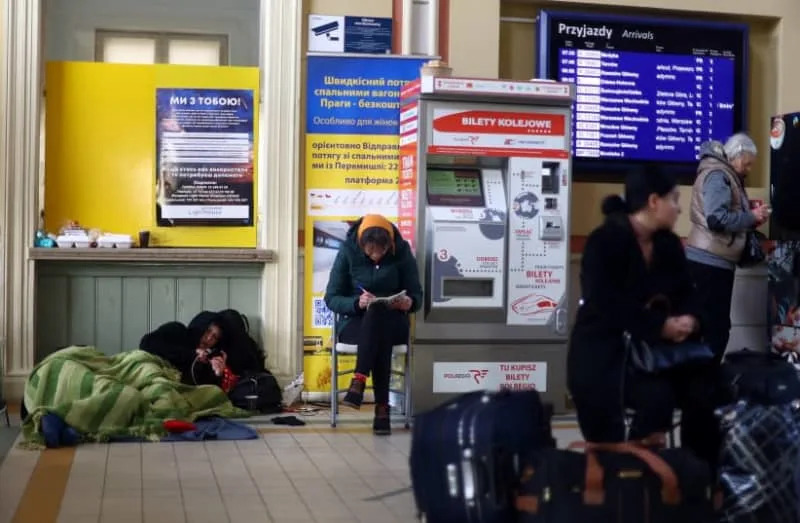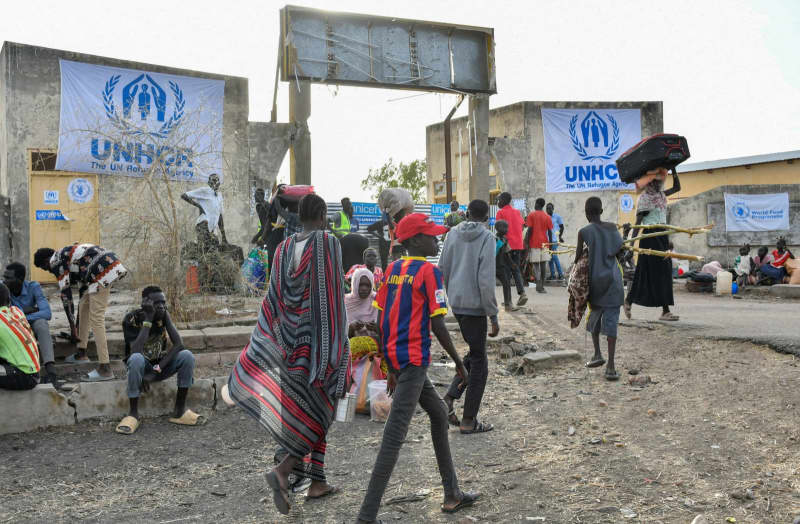Unlike the Ukraine-Russia war, in the Gaza war, not only are regional countries refusing to take in any refugees, but they argue that even considering the idea endangers their national interests.
When Russia launched its full-scale invasion of Ukraine in 2022, triggering the largest refugee crisis in Europe since World War II, neighboring countries — and even states farther afield — opened their doors. Ukrainians seeking shelter were welcomed by the millions.
It was the right and moral thing to do: give refuge to those fleeing a war zone. Who wants to remain trapped in a battlefield?
One European country that was not enthusiastic about taking in refugees was Hungary. While it did not fully close its border, it imposed significant restrictions on entry and support in certain circumstances. In August 2024, Hungary went a step further, passing a law limiting state support only to refugees from active war zones in Ukraine.
Human rights organizations, the European Commission, and the UN High Commissioner for Refugees (UNHCR) slammed the Hungarian position, calling it inhumane and a violation of EU law. Human Rights Watch called these measures “cruel” and a “new low” in refugee policy. The European Commission was urged to initiate legal proceedings and impose penalties.
But what was true for refugees from the Russian-Ukrainian war is not true in the Gaza-Israel war. Here, not only are regional countries refusing to take in any refugees, but they argue that even considering the idea endangers their national interests.

Ukrainian refugees rest in the ticket hall at Przemysl Glowny train station, after fleeing the Russian invasion of Ukraine, Poland, March 26, 2022. (credit: REUTERS/HANNAH MCKAY)
And the world — including the moralizing human rights organizations — is largely silent. Egypt, Jordan, and the Gulf states are not called out for their adamant refusal to absorb a significant number of Gazans; instead, Israel is castigated for even suggesting that those seeking to flee Gaza should be allowed to leave.
Highlighting this double standard
Prime Minister Benjamin Netanyahu highlighted this double standard in an interview last week with the Abu Ali Express Telegraph channel. He noted that, according to a variety of polls — Western surveys, Arab polls, and Israeli studies — at least 50% of Gaza’s population would like to leave, even if some hope to return later.
“Everyone, including Western countries and human rights organizations scream: ‘What, don’t leave — all those who are supposedly concerned about the Palestinians,” Netanyahu said.
Instead of allowing people who want to leave to do so, “the world wants to imprison them in a war zone, just like Hamas,” he said. “What are we saying: that they should have free choice.” He stressed that it is a fundamental human right to be able to choose whether to stay or leave, yet in this case, the champions of human rights are silent.
At the end of the interview, Netanyahu remarked that Israel could open the Rafah Crossing to allow Gazans to go to Egypt, “but they will be stopped immediately in Egypt.”
This comment infuriated the Egyptians. Foreign Minister Madgy Abdelatty shot back in Nicosia on Friday: “Displacement is not an option and it is a red line for Egypt and we will not allow it to happen.”
In other words, Egypt — consistent with the policy it has pursued throughout the war — will not allow Palestinians fleeing a war zone to enter its territory in search of safety. As Abdelatty told reporters: “Displacement means liquidation and the end of the Palestinian cause, and there is no legal or moral or ethical ground to evict people from their homeland.”
So while Gazans are saying they want to leave, the Egyptians are saying: No, you must stay, for the sake of the Palestinian cause.
Abdelatty then escalated further: “What is happening on the ground is far beyond imagination. There is a genocide in motion there, mass killing of civilians, artificial starvation created by the Israelis.”
Interesting. A genocide, mass killing of civilians, Israeli-induced starvation — yet Egypt will not allow Gazan refugees across the border, not even temporarily to alleviate that “genocide.”
Netanyahu, however, did not remain silent. In a rare instance of Israel publicly responding to anti-Israel rhetoric from Egypt, the Prime Minister’s Office issued a rebuttal Saturday night.
“Contrary to the Egyptian Foreign Ministry’s claim [that Israel was evicting Gazans], Prime Minister Netanyahu was referring to every person’s basic right to choose where they live — a right that holds true at all times, and especially in wartime,” the statement read. “Instead, the Egyptian Foreign Ministry prefers to confine in Gaza — against their will — residents who wish to leave the war zone.”
And the world lets Egypt’s closed-door policy pass.
Imagine the global uproar if Moldova, Poland, and Romania had built higher walls and thicker barbed wire to keep out Ukrainian refugees in 2022. Imagine if the Romanians had said to the Ukrainians, “Stay, so the Russians don’t take over your homeland,” and slammed the doors in their faces.
It wouldn’t have happened; it didn’t happen.
Nor is this contrast limited to Ukraine. Look at another Middle East conflict: Syria.
The Syrian civil war created an estimated seven million refugees, many of whom found safety in Europe. Germany alone took in just under 650,000, according to the UNHCR’s 2022 data. Sweden accepted about 120,000, Austria 65,000, the Netherlands and Greece around 40,000 each. Muslim Turkey took in more than three million.
Yet these same countries will not take in Gazans, even temporarily, and then slam Israeli officials for daring to suggest they give shelter to Gazans fleeing war. Spain, Ireland, the Netherlands, and France, all outspoken in their condemnation of Israel’s war against Hamas, have not exactly opened their gates to Gazans.
Speak with senior European diplomats, and they will tell you bluntly: it will never happen. Ask why Syrian refugees, yes, but not Gazans, and the answer is that the Syrian wave hardened public opinion against immigration. For domestic political reasons, they say, European governments cannot afford to let in Gazans.
Reasons why European countries won’t take in more refugees
Germany, for instance, has 5.5 million Muslims in a population of 83 million. The main reason given now to explain why Berlin will not open its gates to Gazans, as it did to Syrians, is that doing so could hand electoral victory to the far-right anti-immigrant AfD.
And Germany is not alone. Throughout Europe, previous waves of Muslim immigrants have led to a backlash against allowing in any more refugees — even from Gaza.
Tellingly, in many of these countries where there are frequent, large, and loud demonstrations against Israel’s war in Gaza, few of them feature signs calling on the local governments to let in Gazan refugees.
When it comes to refugees, therefore, it seems that lofty principles shift depending on who is fleeing and from where.
The Ukrainians were welcomed. The Syrians, to a point, were accepted. But the Gazans? They are told to stay put while regional and some European countries lock their doors and accuse Israel of genocide — a “genocide” that could be eased in an instant by simply opening those doors. Yet they refuse, and that refusal makes their accusations not just hollow, but cynical — exposing the uncomfortable truth that their outrage is less about saving Gazans, and more about demonizing Israel.
